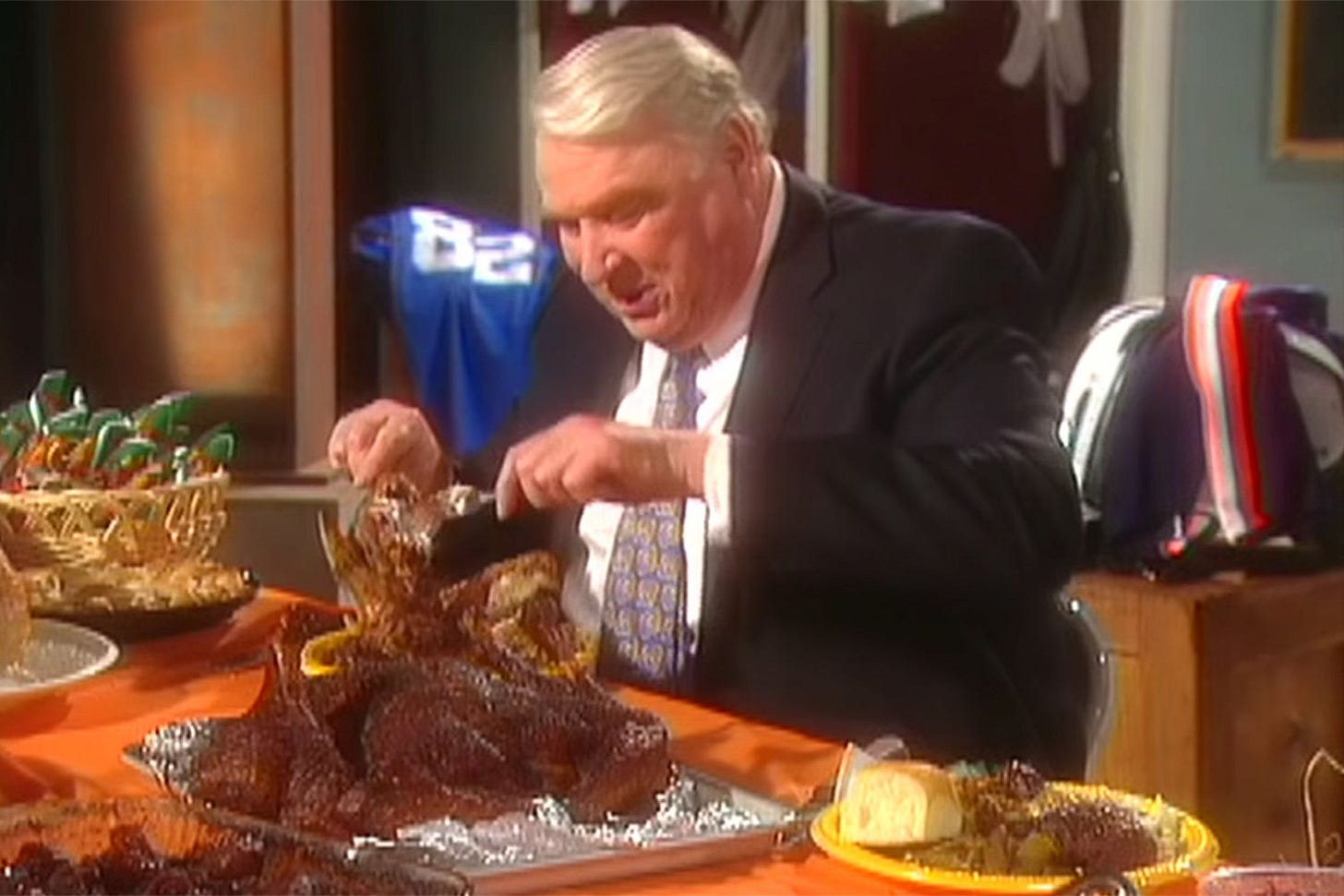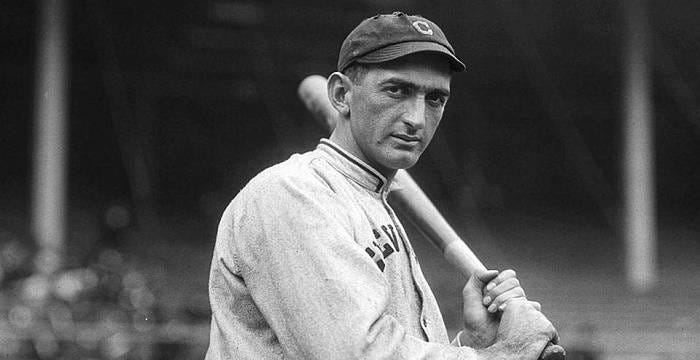John Madden and Pro-Sports Mysticism
Field of Dreams has become something of a cult-classic in the Sports Film genre. Existing within a category of movies which was already unashamed to wax poetic, Field of Dreams was different in that it went beyond the sports-movie mandate to inspire its audience, and explicitly mystified the love of America’s pastime.
If you haven’t seen Field of Dreams, then you’re probably under thirty. But I’ll summarize: Kevin Costner plays a Noah-like figure to some disembodied voice, which tells him to build a baseball diamond in his corn field. Of course, people call him a nut, and the project nearly bankrupts his family. But soon he is rewarded for his faith by old-timey baseball ghosts appearing out of the corn to play in his field. Is it heaven? No, not at all. Its Iowa.
To the proponents of new age, or vague spiritualism which sometimes espouses that human souls will wonder the world as ghosts until they settle some hazy concept of “unfinished business,” Field of Dreams makes sense.
After being traded to the Chicago White Sox, “Shoeless” Joe Jackson’s career ended in disgrace because of his alleged participation in the infamous “Black Sox Scandal” of the 1919 World Series. Despite reasonable evidence that he was not a willful participant, Shoeless Joe was banned from baseball in his prime, and barred from ever entering The Baseball Hall of Fame. And for that reason you could say that he has unfinished business — for to the most faithful fans, what is the Hall of Fame if not some version of business, finished. Enshrinement is the capstone to a job well done.
At this point in the narrative, you may be asking yourself, “Self, why is this guy rambling on about baseball and Kevin Costner, when this article is supposed to be about John Madden? When’s he going to talk about football stuff?” And you’d be right to do so. Let’s pivot there now, lest I be accused of throwing you a red herring.
I grew up in a home that held sports in high regard. And while the glorification of pro-athletes can certainly go too far, I think it is healthy for a young boy to have some solid role models in high-levels of competitive sport. I cannot discount the influence it has on a young boy’s mind when a heavy-weight boxer wears a Bible verse. Kids notice when big men bow the knee to Christ. But I digress.
When a boy is young, his football, hockey or baseball cards aren’t just pictures of men with stats. They are inspiration. They are options. I remember comparing my height and abilities to some of my favorite athletes as I grew. But we need to make sure we see sports in their proper place. Without a Christ-centered worldview, people will certainly give their worship to idols. (The promised pivot!)
The NFL has been extremely effective in capitalizing upon our propensity to worship, even going as far as creating their own secular Sunday ritual. And with very high-level productions over the decades, NFL Films has successfully built a library of hagiographic accounts of their so-called Football Legends. Like Field of Dreams, their sense of pageantry is thick.
But having a Christ-centered worldview from a young age equipped me to see sports and all the pomp of pro-athletes for what it is — a pastime. And so all of this was just fun and games in my mind. That was until 2006, when John Madden said something that lifted the veil and gave me a peek behind the curtain at the pro-sports alter. I’ve placed a shortened transcript from his Hall of Fame enshrinement speech below.
“I think over in the Hall of Fame, that during the day, the people go through, they look at everything. At night, there's a time when they all leave. All the fans and all the visitors leave the Hall of Fame. Then there's just the workers. Then the workers start to leave. It gets down to there's just one person. That person turns out the light, locks the door.
I believe that the busts talk to each other. I can't wait for that conversation, I really can't. Vince Lombardi, Knute Rockne, Reggie, Walter Payton, all my ex players, we'll be there forever and ever and ever talking about whatever. That's what I believe. That's what I think is going to happen, and no one's ever going to talk me out of that.”
To me, this sounds a lot more like the premise of Toy Story. But even though this statement was met with some mild laughter, it seemed that the audience chuckles had more to do with levity. I certainly didn’t get the impression that John Madden was joking. Like his charming Turducken-evangelism, John Madden was just speaking plainly about what he loved.

But up until then, I never realized the extent of the soft-serve idolatry being peddled by our modern sports leagues. I suppose that it was normalized, and it didn’t seem to tread on God’s domain, I thought. Of course, the Lord is lord of all things, and everything the Christ-follower does (even sports) is to be done heartily as to Him, not to man. But Madden’s speech showed me that there was (at least a segment of) people who saw sports as a means to immortality. And once you see it, you can’t un-see it. When Oakland Raider’s founder (and John Madden’s good friend) Al Davis died in 2011, a memorial torch was commissioned to keep his “eternal flame” lit forever. Increasingly, in our post-Christian culture, we see words like “immortalized” and “eternity” being thrown around Hall of Fame discussions.
American Football has never been the same since the departure of the late John Madden. He was a one of a kind personality. But every death should have a sobering effect on us all, realigning things in their proper order of priority. Essentially, death should put games in their rightful place. Sports are great for passing time, but they are a mere pastime, which is how our once-Christian culture was comfortable referring to them. It is a consumerist push, and frankly a sign of a post-Christian culture that accepts sports as the means to obtaining any sort of glorification.
Anyway, watch out if you’re a farmer growing corn around Canton or Cooperstown. Hollywood seems pretty hard up for ideas these days, and Field of Dreams is overdue for sequel (or even a reboot!).
By the way, have you read Frog of Arcadia yet?







